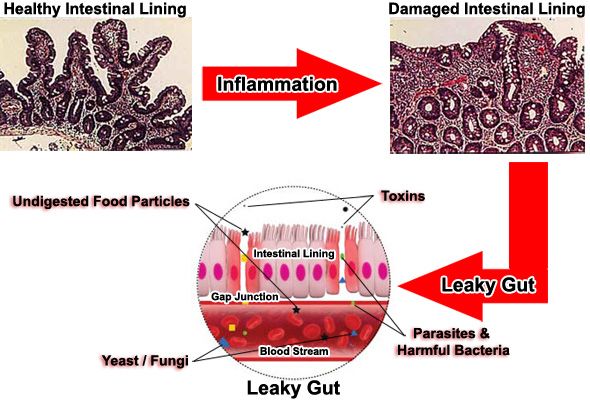
Do you know what the silent killer is that is affecting every single aspect of your health? We didn’t either, but an article at Collective Evolution showed introduced us to some pretty amazing information:
*Information in this article is provided by Dr. Marquis, a Chiropractic Physician who is Board Certified in Clinical Nutrition in San Luis Obispo County, CA. He also holds certifications in Botanical Medicine, Class IV Laser Therapies, Manipulation Under Anesthesia, Interactive Metronome Therapies and is currently pursuing another Diplomate in Functional Neurology.
There is a silent killer among us. In fact, it’s likely affecting you or someone you know at this very moment.

BYPASS THE CENSORS
Sign up to get unfiltered news delivered straight to your inbox.
You can unsubscribe any time. By subscribing you agree to our Terms of Use
It’s directly related to a plethora of ailments, including pain, obesity, ADD/ADHD, peripheral neuropathy, diabetes, heart disease, strokes, migraines, thyroid issues, dental issues and cancer. The culprit? Chronic inflammation.
Sadly, a large number of people are suffering from the symptoms of chronic inflammation but do not understand where it’s all stemming from or how to correct it. Unfortunately, doctor-recommended pharmaceuticals are normally the first go-to for people suffering from any of the previously mentioned disorders.
It must be stated, however, that some bodily inflammation is absolutely normal, in fact it’s essential. It is when the regulation of the inflammatory response falls out of balance that problems begin to occur.
Many would be shocked to know that chronic inflammation and therefore most disorders originate in the gut. Our gut is the gateway to good health, a popular adage and for good reason, as you’ll soon discover.
Inflammatory Origins: Looking At The Gut
Our guts are lined with a semi-permeable membrane so large that it could be stretched out as wide as a tennis court. The permeability of this membrane fluctuates due to the presence and varying levels of chemical conditions.
For example when your cortisol is elevated due to the stress of an argument or your thyroid hormone levels fluctuate due to burning the midnight oil your intestinal lining becomes more permeable in real time.
Then you sit down to eat and partially undigested food, toxins, viruses, yeast and bacteria have the opportunity to pass through the intestine and access the bloodstream, this is known as leaky gut syndrome, or LGS.
As this fluctuation of permeability happens over time, the microvilli (cellular folds that act as absorption/secretion points in the gut) become damaged, thereby compromising your gut’s ability to absorb proper nutrients. So, as invaders continue to enter our bloodstream, the body attacks these invaders by responding with inflammation, allergic responses, and more.
Since your immune system can become overburdened, these inflammatory triggers are cycled continuously through your blood where they affect nerves, organs, connective tissues, joints and muscles. Enter disease.
Inflammation Triggers & Symptoms
Inflammation can and often does occur for years before it exists at levels sufficient to be apparent or clinically significant. How long it has been smouldering really determines the degree of severity of a disease and often the prognosis assuming the inflammation can be controlled. One could also argue that without inflammation most disease would not even exist.
The following is a chart (taken from Mercola’s website) showing the relationship between inflammation and various diseases:
Allergy: 4 Immune Mediated Types + Sensitivities, all of which cause inflammation.
Alzheimer’s: Chronic inflammation destroys brain cells.
Anemia: Inflammatory cytokines attack erythropoietin production.
Ankylosing Spondylitis: Inflammatory cytokines induce autoimmune reactions against joint surfaces.
Asthma: Inflammatory cytokines induce autoimmune reactions against airway lining.
Autism: Inflammatory cytokines induce autoimmune reactions in the brain arresting right hemisphere development.
Arthritis: Inflammatory cytokines destroy joint cartilage and synovial fluid.
Carpal Tunnel Syndrome: Chronic inflammation causes excessive muscle tension shortening tendons in the forearm and wrist compressing the nerves.
Celiac: Chronic immune mediated inflammation damages intestinal lining.
Crohn’s Disease: Chronic immune mediated inflammation damages intestinal lining.
Congestive heart failure: Chronic inflammation contributes to heart muscle wasting.
Eczema: Chronic inflammation of the gut and liver with poor detoxification and often antibodies against Transglutaminase-3.
Fibromyalgia: Inflamed connective tissue often food allergy related and exacerbated by secondary nutritional and neurological imbalances.
Fibrosis: Inflammatory cytokines attack traumatized tissue.
Gall Bladder Disease: Inflammation of the bile duct or excess cholesterol produced in response to gut inflammation.
GERD Inflammation of the esophagus and digestive tract nearly always food sensitivity and pH driven.
Guillain-Barre: Autoimmune attack of the nervous system often triggered by autoimmune response to external stressors such as vaccinations.
Hashimoto’s Thyroiditis: Autoimmune reaction originating in the gut triggered by antibodies against thyroid enzymes and proteins.
Heart attack: Chronic inflammation contributes to coronary atherosclerosis.
Kidney failure: Inflammatory cytokines restrict circulation and damage nephrons and tubules in the kidneys.
Lupus: Inflammatory cytokines induce an autoimmune attack against connective tissue.
Multiple Sclerosis: Inflammatory cytokines induce autoimmune reactions against myelin.
Neuropathy: Inflammatory cytokines induce autoimmune reactions against myelin and vascular and connective tissues which irritate nerves.
Pancreatitis: Inflammatory cytokines induce pancreatic cell injury.
Psoriasis: Chronic inflammation of the gut and liver with poor detoxification.
Polymyalgia Rheumatica: Inflammatory cytokines induce autoimmune reactions against muscles and connective tissue.
Rheumatoid Arthritis: Inflammatory cytokines induce autoimmune reactions against joints.
Scleroderma: Inflammatory cytokines induce an autoimmune attack against connective tissue.
Stroke: Chronic inflammation promoted thromboembolic events.
Surgical complications: Inflammatory cytokines (often pre-dating the surgery) slow or prevent healing.
Treating Inflammation
The typical approach to treating an auto-immune disease is immune suppressing agents or steroids. This tactic merely covers up the underlying issue, which is almost always related to chronic inflammation. This type of treatment only saves time in the deterioration of your body.
Since inflammation is commonly mediated by the gut it is a logical starting point in the evaluation process of any patient. There are seven common areas that should be considered when looking at causative factors for gastrointestinal dysfunction that create the environment for chronic inflammation. They are listed below along with key triggers within the category of evaluation:
Diet: Alcohol, Gluten, Casein, Processed Foods, Sugar, Fast Food
Medications: Corticosteroids, Antibiotics, Antacids, Xenobiotics
Infections: Such as H-Pylori, Yeast or Bacterial Overgrowth, Viral or Parasite Infection
Stress: Increased Cortisol, Increased Catecholamines
Hormonal: Thyroid, Progesterone, Estradiol, Testosterone
Neurological: Brain Trauma, Stroke, Neuro-degeneration
Metabolic: Glycosylated End Products (inflammatory end products of sugar metabolism), Intestinal Inflammation, Autoimmune
Pardon the redundancy in this statement as you’ve most likely heard it before, but stress and diet are the two key factors in reversing inflammation and thereby most diseases. Here are some final tips in getting these two factors under control:
Lifestyle: Remove adverse mechanisms (Stress, Over-exercising, Poor Sleep, Blood Sugar Dysregulation, Poor Social Behaviors.) Lifestyle factors are huge, the stress response triggers immune marker IL6 which turns on the immune pathway TH17 which is the fast track to Autoimmunity.
Lifestyle: Restore beneficial mechanisms: Create conditions of love & appreciation, keep positive attitudes, maintain proper exercise (training to a maximum heart range; i.e. Peak Fitness exercises), have adequate sleep, restore blood sugar balance, and facilitate healthy social interactions. All these things promote natural systemic opioids which pushes the immune pathway TH3 which reduces Autoimmunity.
Dietary Support: Stabilize blood sugar, remove food Autoimmune triggers, and promote intestinal integrity with proper flora and nitric oxide and glutathione pathways. Include fermented foods and supplement appropriately as may be needed.
For more information check out Mercola’s article on inflammation and disease HERE



